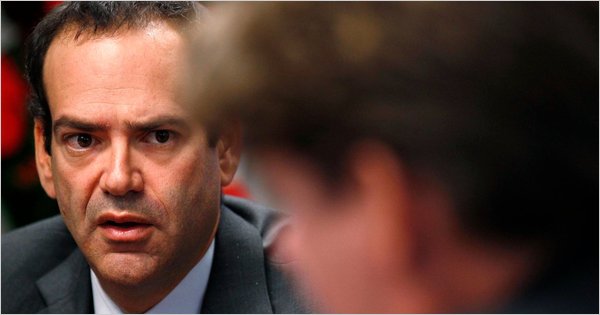"System Is Less Safe Than Before": Watchdog Says Dodd-Frank Won't Stop Future Bailouts; Clashes With Treasury At First Issa Hearing

Neil Barofsky and Timothy Massad testified on TARP Wednesday in the first hearing of the House Oversight committee with Darrell Issa as Chairman.
If you remember from two weeks ago, Barofsky made pretty big news with his report that Geithner told SIGTARP staff that he and Treasury were again prepared to take 'extraordinary government action' to rescue any systematically important financial institution should the need arise. This despite language in Dodd-Frank that explicitly denies this power to Treasury.
Barofsky and Massad, a senior official in charge of TARP, squared off.
---
WASHINGTON — A Treasury Department official said Wednesday that the financial regulatory law enacted last summer will help the government avoid future bailouts, deflecting criticism that those risks have grown since the financial crisis.
Timothy Massad, a senior Treasury official managing the $700 billion bailout, told a House panel that the law lets regulators impose tougher rules on big financial companies and shutter those that pose a threat.
Massad was disputing testimony from Inspector General Neil Barofsky, who has oversight authority over the bailout fund created at the height of the financial crisis in 2008.
Barofsky told the panel that the law won't end bailouts. He said Wall Street banks have grown since the crisis, so a single failure is more likely to threaten the financial system.
- Barofsky cited comments by Treasury Secretary Timothy Geithner and other top regulators who suggested the government would rescue banks if one of them threatened the broader financial system. Geithner said in an interview with Barofsky's staff last month that despite the tools included in the financial law, "we may have to do exceptional things again" to prevent a similar crisis.
Barofsky also criticized the administration's efforts to help homeowners avoid foreclosure.
As of November, about 774,000 homeowners had dropped out of the administration's main foreclosure-relief program. That's about 54 percent of the more than 1.4 million people who applied. The program had helped more than 500,000 homeowners permanently lower their monthly payments. Of the $50 billion originally set aside for the program, only about $1 billion has been spent, Barofsky said.
---
Risks of a future crisis have increased due to bailouts...
Video - Barofsky with the Investigative Fund
Barofsky lays out the breadth of his work and is blunt in his assessment about whether the financial system, now with fewer and bigger banks, is yet safe.
- "I think we may be in a far more dangerous place today than we were a year ago."
---
Further reading on Geithner's statement on bailouts...

 Jan 27, 2011 at 4:46 AM
Jan 27, 2011 at 4:46 AM
Reader Comments (2)
http://uddebatt.wordpress.com/2011/01/23/how-the-world-temperature-%E2%80%9Crecord%E2%80%9D-was-manipulated-trough-dropping-of-stations/
http://newjersey.watchdog.org/2011/01/22/david-stevenson/
[snip]
A regional cap and trade program you probably never heard of will cost the citizens’ of northeast coastal states $3.5 billion in hidden taxes. National cap and trade appears to be dying and the Chicago Carbon Exchange closed its’ doors to carbon trading October 29. But ten states joined to create the Regional Greenhouse Gas Initiative (RGGI) in 2007 which auctions permits to electric power plants to emit carbon dioxide. The power plants pass the cost on in higher electricity rates.
The RGGI goal is to reduce carbon dioxide emissions from power plants over 25MW in size by 10% by 2019. Meanwhile, power companies in the ten RGGI states had already decreased CO2 29% by 2009, after adjusting for lower electricity consumption caused by the recession. Increasingly, many ratepayers are asking these states to declare victory and withdraw from RGGI, return the $300 million/yr carbon tax to consumers, and avoid an expensive experiment in energy market manipulation. Legislation to do just that has been proposed in New Jersey.